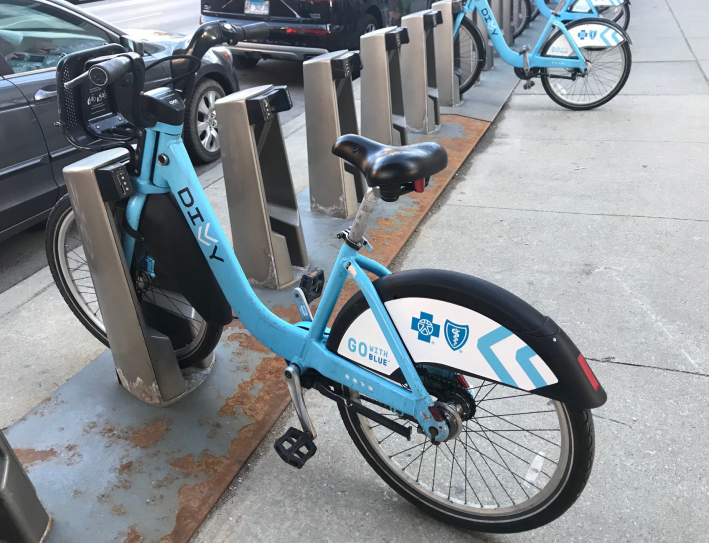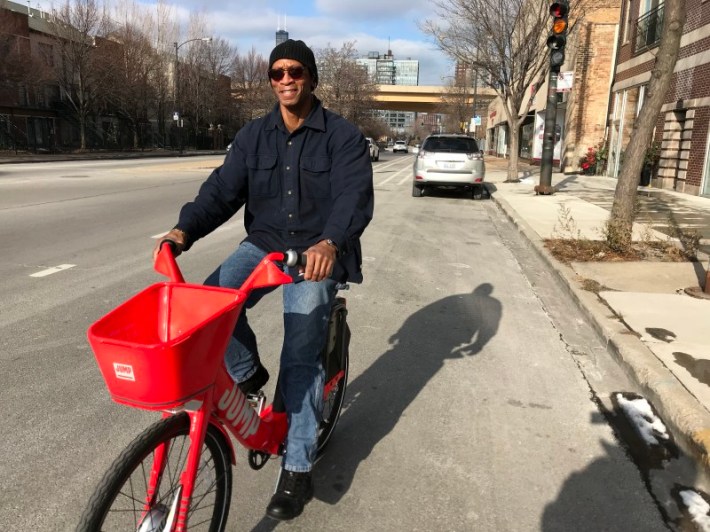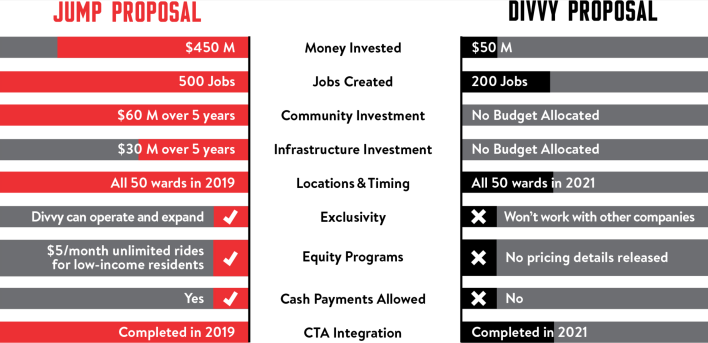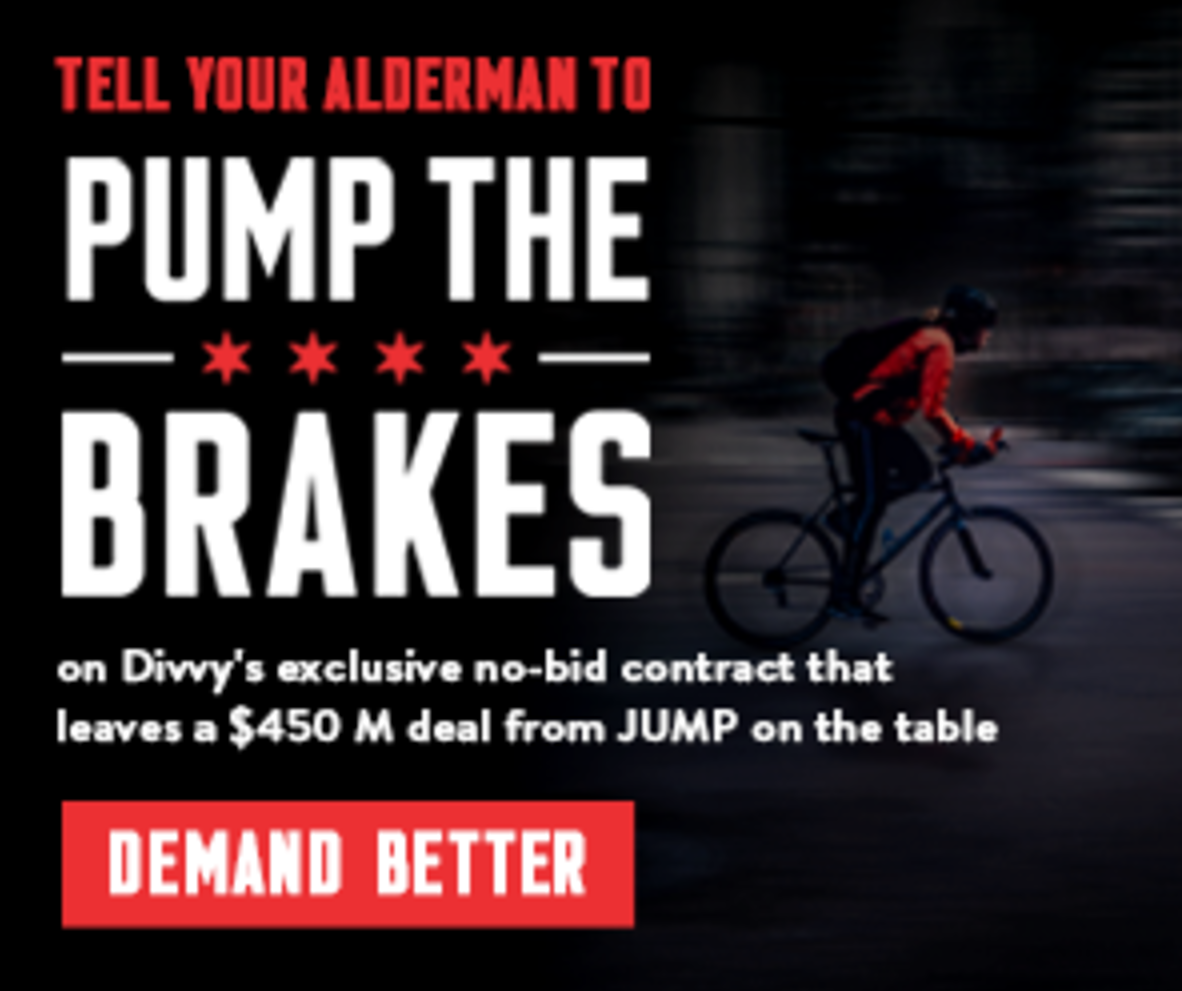The current conflict over who will expand Chicago bike-share citywide is essentially a proxy war between the two major ride-hailing companies. This week Uber rolled out questionable tactics in its effort to kill to the impending Lyft/Divvy deal, in the form a website urging residents to lobby their alderman against it, featuring some misleading, and downright false, statements about the Lyft contract.
Lyft purchased Motivate, the Divvy concessionaire, last summer, and on March 12 the city of Chicago announced that it planned to enter a sponsorship and expansion deal with the ride-sharing firm. Pending City Council approval, a contract amendment would have Lyft replace Blue Cross Blue Shield of Illinois as the sponsor, which means Lyft logos would replace Blue Cross emblems on all the bikes. The system would expand by 10,500 cycles and 175 stations to serve the entire city within three years, with Lyft spending $50 million on the hardware. The city would get an additional $77 million in revenue during the remaining nine years of the existing contract.
All of the new new bikes would be electric-assist models with a "lock-to" dockless option, so that users could either lock at a station, or to a rack or a pole near their destination. The city would maintain ownership of the Divvy system and the existing hardware, while Lyft would own the new hardware. As part of the agreement, Lyft would be given a monopoly on Chicago bike-share.

Uber owns JUMP Mobility, a dockless electric bike company that participated in Chicago's Far South Side dockless pilot last year. Immediately after the Lyft/Divvy deal announcement, Uber notified the Chicago Sun-Times that it had made an expansion pitch to the city last December 5.
The company said it offered to deploy 20,000 JUMP bikes and 20,000 dockless electric scooters in all 50 wards by May 2019. It also claimed it would spend $200 million over five years on bike infrastructure, including charging station, bike racks, and bike lanes, which would be increased to a whopping $450 million investment if Uber was given the bike-share monopoly.
Chicago Department of Transportation commissioner Rebekah Scheinfeld told the Sun-Times that the city never seriously considered Uber's pitch because it is in an existing contract with Lyft/Motivate, and because it was important to the city to maintain ownership of the city's bike-share system. "We think having a dockless system citywide in addition to a Divvy system citywide would create unnecessary redundancy and more impact to the public way.” She added that Uber's desire to deploy scooters was also a deal-breaker. (The Lyft contract would not include scooters or block other companies from operating scooters here.)
The Sun-Times headline claimed that Mayor Rahm Emanuel "might have left money and bikes on the table by choosing Lyft" over Uber for the expansion. Scheinfeld pushed back at that notion in a subsequent letter to the paper noting that "The idea that Uber could, from scratch, achieve city-wide service by May and match the current level of customer service that Chicagoans expect isn’t just implausible, it’s laughable."
That was a very sensible statement by the commissioner. If only she had voiced the same kind skepticism about Elon Musk's infinitely more implausible O'Hare Express scheme.

Scheinfeld added that, unlike the Lyft deal, Uber's pitch didn't give the city the right to set quality standards or limit price increases. (Under the Lyft contract, CDOT would have to approve any Lyft fare increase over 10 percent per year, although that could still result in the cost of the $99 annual membership more than doubling during the next nine years.) In addition, the Uber pitch didn't include sharing ad revenue. "And perhaps more importantly, Uber has never executed a bike sharing program to the scale of what exists in Chicago to the standards Divvy riders expect," she wrote.
The Active Transportation Alliance has endorsed the Lyft/Divvy deal, arguing that the Uber offer is flawed because it would have privatized most of Chicago's bike-share network, and Uber could have “removed bikes at any time.” We've seen that happen with privately owned dockless fleets in cities like Camden, New Jersey, and Rockford, Illinois, where, after the systems proved to be unprofitable, the companies packed up their bikes and went home. Read Active Trans' letter to Committee on Pedestrian and Traffic Safety letter chair Walter Burnett on the Lyft/Divvy deal here.
That's not to say that there aren't potential pitfalls with the Lyft deal. Like many other projects these days, Mayor Rahm Emanuel is trying to move the initiative swiftly through the City Council on his way out the door. A Committee on Pedestrian and Traffic Safety hearing on the contract is scheduled for this Thursday at 11 am in room 201 A of City Hall, and if it passes in committee the full Council will vote on it on April 10. The devil's in the details, so it's crucial for aldermen to scrutinize the contract before passing it. 32nd Ward alderman Scott Waguespack has promised to do so.
I read your initial comment - would go over it for sure.
— Scott Waguespack (@ward32chicago) March 13, 2019
But that doesn't excuse Uber/JUMP from launching a rather misleading online campaign to thwart the deal under the url PumpTheBrakesChicago.com. I first learned about it via an ad on the Politico Playbook news digest this morning.
"The city of Chicago is racing into an exclusive, backroom deal that gives Divvy a monopoly and leaves money, jobs, and equitable transportation access for all neighborhoods on the table," the ad reads. "The City turned down a $450 million bike-share investment package from JUMP—an investment that would have provided access to bike-share across all 50 wards by May 2019—in favor of a $50 million deal with Divvy that excludes all competition and won't see bike-share expanded until 2021."
There are several misleading statements and half-truths there. The Lyft deal would also provide bike-share access for all neighborhoods. Uber is saying that the city passed up a chance for a $450 million bike-share deal in favor of a Lyft monopoly, but Uber wanted the monopoly for itself, and would have only spent $200 million if it didn't get it. And while 2021 is a realistic deadline for deploying 10,500 more bikes citywide, the notion that Uber -- which has no experiencing operating a system with several thousand bikes in a large city -- could set up a 20,000-bike system in a matter of months is, indeed, "laughable."

The Pump the Breaks website includes a link for residents to contact their aldermen to lobby them to kill the Lyft deal. It contains additional misleading or false statements about the Lyft contract:
- Uber claims the deal would give Lyft a monopoly "for more than ten years." Nope, only nine.
- Uber claims it would offer $5/month unlimited rides for low-income residents whereas no pricing details have been released about the Lyft plan, ignoring the fact that the city announced that the existing $5/year Divvy for Everyone (D4E) program would be expanded under the Lyft deal.
- Uber claims cash payment would not be allowed under the Lyft deal, but cash payments are already allowed under D4E.
Efforts like this by venture-capital backed mobility companies trying to shape Chicago transportation policy are tiresome. We recently called out Lime for using a similar tactic to try to influence the Chicago mayoral election. In fairness, Lyft has surely done similar lobbying efforts to influence local ride-hailing legislation. But when the info in the lobbying materials is misleading and, in some cases, inaccurate, as is the case with Uber's new campaign, that's a problem.





